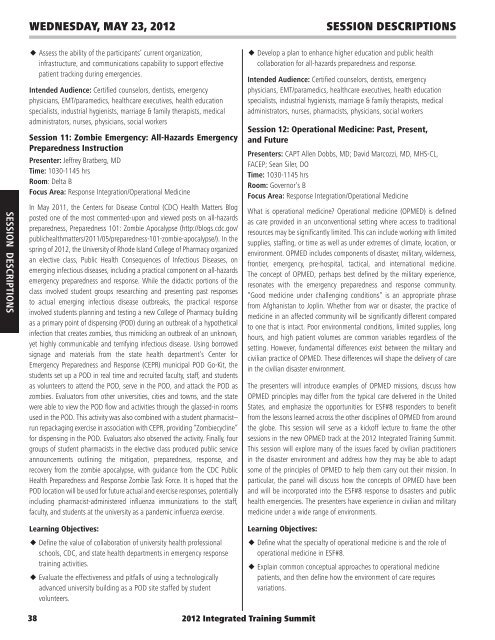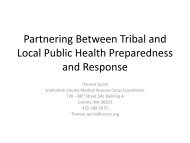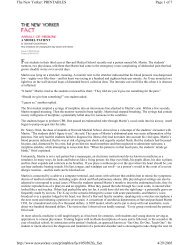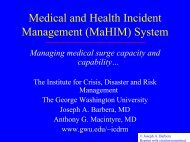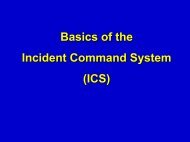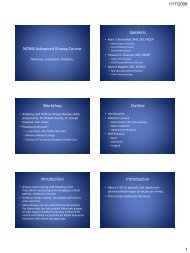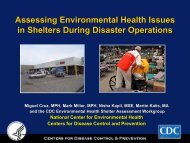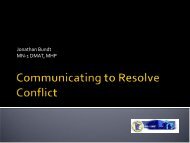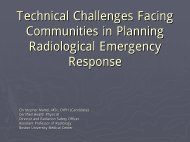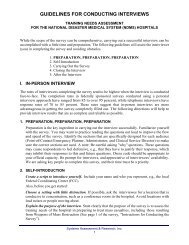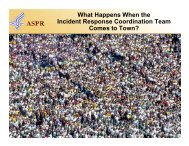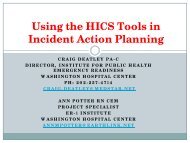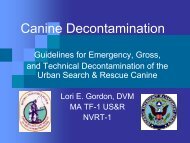wednesday, May 23, <strong>2012</strong>Session Descriptionssession Descriptionsu Assess the ability of the participants’ current organization,infrastructure, and communications capability to support effectivepatient tracking during emergencies.Intended Audience: Certified counselors, dentists, emergencyphysicians, EMT/paramedics, healthcare executives, health educationspecialists, industrial hygienists, marriage & family therapists, medicaladministrators, nurses, physicians, social workersSession 11: Zombie Emergency: All-Hazards Emergency<strong>Preparedness</strong> InstructionPresenter: Jeffrey Bratberg, MDTime: 1030-1145 hrsRoom: Delta BFocus Area: Response Integration/Operational MedicineIn May 2011, the Centers for Disease Control (CDC) Health Matters Blogposted one of the most commented-upon and viewed posts on all-hazardspreparedness, <strong>Preparedness</strong> 101: Zombie Apocalypse (http://blogs.cdc.gov/publichealthmatters/2011/05/preparedness-101-zombie-apocalypse/). In thespring of <strong>2012</strong>, the University of Rhode Island College of Pharmacy organizedan elective class, Public Health Consequences of Infectious Diseases, onemerging infectious diseases, including a practical component on all-hazardsemergency preparedness and response. While the didactic portions of theclass involved student groups researching and presenting past responsesto actual emerging infectious disease outbreaks, the practical responseinvolved students planning and testing a new College of Pharmacy buildingas a primary point of dispensing (POD) during an outbreak of a hypotheticalinfection that creates zombies, thus mimicking an outbreak of an unknown,yet highly communicable and terrifying infectious disease. Using borrowedsignage and materials <strong>from</strong> the state health department’s Center forEmergency <strong>Preparedness</strong> and Response (CEPR) municipal POD Go-Kit, thestudents set up a POD in real time and recruited faculty, staff, and studentsas volunteers to attend the POD, serve in the POD, and attack the POD aszombies. Evaluators <strong>from</strong> other universities, cities and towns, and the statewere able to view the POD flow and activities through the glassed-in roomsused in the POD. This activity was also combined with a student pharmacist–run repackaging exercise in association with CEPR, providing “Zombiecycline”for dispensing in the POD. Evaluators also observed the activity. Finally, fourgroups of student pharmacists in the elective class produced public serviceannouncements outlining the mitigation, preparedness, response, andrecovery <strong>from</strong> the zombie apocalypse, with guidance <strong>from</strong> the CDC PublicHealth <strong>Preparedness</strong> and Response Zombie Task Force. It is hoped that thePOD location will be used for future actual and exercise responses, potentiallyincluding pharmacist-administered influenza immunizations to the staff,faculty, and students at the university as a pandemic influenza exercise.Learning Objectives:u Define the value of collaboration of university health professionalschools, CDC, and state health departments in emergency responsetraining activities.u Evaluate the effectiveness and pitfalls of using a technologicallyadvanced university building as a POD site staffed by studentvolunteers.u Develop a plan to enhance higher education and public healthcollaboration for all-hazards preparedness and response.Intended Audience: Certified counselors, dentists, emergencyphysicians, EMT/paramedics, healthcare executives, health educationspecialists, industrial hygienists, marriage & family therapists, medicaladministrators, nurses, pharmacists, physicians, social workersSession 12: Operational Medicine: Past, Present,and FuturePresenters: CAPT Allen Dobbs, MD; David Marcozzi, MD, MHS-CL,FACEP; Sean Siler, DOTime: 1030-1145 hrsRoom: Governor’s BFocus Area: Response Integration/Operational MedicineWhat is operational medicine? Operational medicine (OPMED) is definedas care provided in an unconventional setting where access to traditionalresources may be significantly limited. This can include working with limitedsupplies, staffing, or time as well as under extremes of climate, location, orenvironment. OPMED includes components of disaster, military, wilderness,frontier, emergency, pre-hospital, tactical, and international medicine.<strong>The</strong> concept of OPMED, perhaps best defined by the military experience,resonates with the emergency preparedness and response community.“Good medicine under challenging conditions” is an appropriate phrase<strong>from</strong> Afghanistan to Joplin. Whether <strong>from</strong> war or disaster, the practice ofmedicine in an affected community will be significantly different comparedto one that is intact. Poor environmental conditions, limited supplies, longhours, and high patient volumes are common variables regardless of thesetting. However, fundamental differences exist between the military andcivilian practice of OPMED. <strong>The</strong>se differences will shape the delivery of carein the civilian disaster environment.<strong>The</strong> presenters will introduce examples of OPMED missions, discuss howOPMED principles may differ <strong>from</strong> the typical care delivered in the UnitedStates, and emphasize the opportunities for ESF#8 responders to benefit<strong>from</strong> the lessons learned across the other disciplines of OPMED <strong>from</strong> aroundthe globe. This session will serve as a kickoff lecture to frame the othersessions in the new OPMED track at the <strong>2012</strong> Integrated Training Summit.This session will explore many of the issues faced by civilian practitionersin the disaster environment and address how they may be able to adaptsome of the principles of OPMED to help them carry out their mission. Inparticular, the panel will discuss how the concepts of OPMED have beenand will be incorporated into the ESF#8 response to disasters and publichealth emergencies. <strong>The</strong> presenters have experience in civilian and militarymedicine under a wide range of environments.Learning Objectives:u Define what the specialty of operational medicine is and the role ofoperational medicine in ESF#8.u Explain common conceptual approaches to operational medicinepatients, and then define how the environment of care requiresvariations.38<strong>2012</strong> Integrated Training Summit
wednesday, May 23, <strong>2012</strong>u Provide examples of how the priorities of delivering care in a resourcechallengedenvironment may differ <strong>from</strong> the delivery of care undernon-challenged environments.u Describe how physiology rather than resources defines healthcare, andidentify two approaches that differ <strong>from</strong> traditional care.u Describe an example of lessons learned <strong>from</strong> military medicinethat would benefit civilian ESF#8 medical personnel operating in aresource-challenged environment.Intended Audience: Emergency physicians, EMT/paramedics, nurses,pharmacists, physiciansSession 13: Advancements in HPP Regional HealthcareCoalitions: Utah’s ExperiencesPresenters: Kevin McCulley, BS; Sara Sinclair, RN, CNHA, FACHCATime: 1315-1430 hrsRoom: Bayou CDFocus Area: Healthcare Systems<strong>The</strong> ASPR Hospital <strong>Preparedness</strong> Program provides a framework and minimalset of objectives for the development of regional healthcare coalitions, whileappropriately leaving important coalition structural and functional decisionsto states. <strong>The</strong> State of Utah, through partnerships between the Departmentof Health and its local health districts, have developed a successful coalitionmodel that utilizes local health districts as hosting agencies for coalitions.<strong>Through</strong> this partnership, critical community linkages have been sustained,new collaborative partners have been identified, and preemptive preparationsfor the alignment of CDC PHEP and ASPR HPP have been completed. Thissession will provide an overview of the strategies, methods, and challengesrelated to partnering with local health departments for regional healthcarecoalition hosting. <strong>The</strong> session will address the processes utilized to developproject objectives, timelines, and funding allocations. Structural topics willbe reviewed, including the identification, recruitment, and retention ofcoalition partners, the development of core program documents includingMOU/A, coalition charters, and regional response plans. <strong>The</strong> target audiencefor this session will be local, district, and state level staff involved in theimplementation and development of regional healthcare coalitions.Learning Objectives:u Design a plan to determine the regional healthcare coalition structurethat will be successful in the participant’s state, and identify localpartners that will contribute to successful outcomes.u Compare the benefits and challenges of utilizing local health districtsas hosting agencies for coalitions.u Analyze the process of coalition objective development, and determinehow these objectives could be implemented in other states.Intended Audience: Emergency physicians, EMT/paramedics, healthcareexecutives, health education specialists, medical administrators, nurses,physiciansSession DescriptionsSession 14: Emergency Planning for Safe andAppropriate Management of Behavioral HealthPatients During DisastersPresenters: Diane Angelico, Cassandra Suzette WilsonTime: 1315-1430 hrsRoom: Bayou EFocus Area: Healthcare SystemsAs a part of the Florida Department of Health efforts to continue to expandand improve partnerships and joint efforts with health care system partners,the Medical Surge Program has explored a number of approaches to engagepartners. In August 2011, a short survey was sent to hospital and hospitalsystem partners. <strong>The</strong> purpose of the survey was to determine the level ofinterest in short, scheduled, virtual meetings for the exchange of information.<strong>The</strong> distribution lists included 175 unduplicated email addresses. Ninetynineresponses were received with only one negative response. As a result ofthis initial interest, a number of short programs will be offered. <strong>The</strong> programcontent is based on an assessment and prioritization by the target audience,our hospital partners at the direct service level. <strong>The</strong> role of the department isto facilitate and promote participation. To make the sessions more attractiveto participants, continuing education credit is offered as appropriate. <strong>The</strong>presenters come <strong>from</strong> the disciplines that have the highest level of expertisefor the subject area. For example, some sessions, such as safety and securityor active shooter, include a law enforcement component. Use of virtualmeeting technology allows us to have statewide participation. Participantsreceive announcements, registration information, and program materialselectronically. Much of the material and samples shared can be downloadedand customized for site-specific use. <strong>The</strong> initial plan was to limit participationto about 50 sites or participants. <strong>The</strong> first program offered was “UsingDisaster Core Competencies for Hospital Personal.” <strong>The</strong> presenters includeda nurse <strong>from</strong> a small critical access hospital with 25 beds in a rural areaof Florida, a representative <strong>from</strong> a medium hospital with 250 beds, and aphysician <strong>from</strong> a 700+ facility in a large urban area. We were also fortunateto have a hospital health care system rep who addressed how he was able touse the competencies in his system. <strong>The</strong> exchange of information connectedproviders that had not previously had contact and led to a commitmentto share sample materials such as memorandums of agreement. <strong>The</strong> finalcount for the webinar was 64 participants. <strong>The</strong> number may be higher asmore than one person could view and participate in the program once a sitewas logged in. <strong>The</strong> evaluations have been very favorable and a number oftopics have been suggested for future programs.Learning Objectives:u Provide an overview of using short JIT information sharing andtraining programs to address emerging preparedness issues for healthcare system providers.u Demonstrate improved and increased sharing of information and bestpractices between hospitals and health care system partners.u Describe examples of increased engagement of hospitals andstrengthened partnerships between the department and hospitals.session DescriptionsIntended Audience: Emergency physicians, EMT/paramedics, healthcareexecutives, health education specialists, medical administrators, nurses,physicians<strong>2012</strong> Integrated Training Summit 39
- Page 1 and 2: Leading from PreparednessThrough Re
- Page 3 and 4: Table of ContentsAmericans with Dis
- Page 5 and 6: Integrated Training Summit Partner
- Page 7 and 8: Focus area DescriptionsFocus Area D
- Page 9 and 10: Late Breakers & Early RisersTuesday
- Page 11 and 12: Handy Perforated Daily Agendas - De
- Page 13 and 14: Handy Perforated Daily Agendas - De
- Page 15 and 16: Handy Perforated Daily Agendas - De
- Page 17 and 18: Handy Perforated Daily Agendas - De
- Page 19 and 20: WorkshopDescriptions2012 Integrated
- Page 21 and 22: Monday, May 21, 2012Workshop Descri
- Page 23 and 24: MoNday, May 21, 2012Workshop Descri
- Page 25 and 26: MoNday, May 21, 2012Workshop Descri
- Page 27 and 28: Tuesday, May 22, 2012Workshop Descr
- Page 29 and 30: WEDNESday, May 23, 2012dMIS Worksho
- Page 31 and 32: ThurSday, May 23, 2012dMIS Workshop
- Page 33 and 34: SessionDescriptionssession Descript
- Page 35 and 36: wednesday, May 23, 2012Session Desc
- Page 37: wednesday, May 23, 2012Session Desc
- Page 41 and 42: wednesday, May 23, 2012Session Desc
- Page 43 and 44: wednesday, May 23, 2012Session Desc
- Page 45 and 46: Thursday, May 24, 2012Session Descr
- Page 47 and 48: THURsday, May 24, 2012Session Descr
- Page 49 and 50: THURsday, May 24, 2012Session Descr
- Page 51 and 52: THURsday, May 24, 2012Session Descr
- Page 53 and 54: THURsday, May 24, 2012Session Descr
- Page 55 and 56: THURsday, May 24, 2012Session Descr
- Page 57 and 58: FRIday, May 25, 2012Session Descrip
- Page 59 and 60: Tuesday, May 22, 2012MRC WorkshopsM
- Page 61 and 62: Tuesday, May 22, 2012MRC WorkshopsL
- Page 63 and 64: Continuing Education InformationCon
- Page 65 and 66: Continuing Education InformationSes
- Page 67 and 68: Planning CommitteeDawn AnastasiaChe
- Page 69 and 70: PresentersBrian Abrahamson, BAGaylo
- Page 71 and 72: PresentersMary Massey, BSN, MA, MEP
- Page 73 and 74: Presenter DisclosuresAlliance betwe
- Page 75 and 76: 2012 Poster PresentationsMRCPoster
- Page 77 and 78: 2012 Poster PresentationsApplicatio
- Page 79 and 80: 2012 Poster PresentationsCollaborat
- Page 81 and 82: 2012 Poster PresentationsEducation
- Page 83 and 84: 2012 Poster PresentationsSpecial Co
- Page 85 and 86: Integrated Training Summit Acronym


